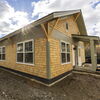Support group | After his father's death, Mike Boulet stepped in to lead Fairfield-based Mainely Trusses. But a slowing housing market may be his biggest challenge yet.
The younger Boulet, who was studying business at Bryant College in Rhode Island, told his father that a truss manufacturer in Augusta had just gone out of business, that the construction market was weak, and that the whole venture just seemed risky.
"I thought my dad was crazy," he says. "I didn't understand why he was starting it up. The projections for the industry were not rosy."
But Boulet never would have guessed that only two years later, at age 23, he would be running Mainely Trusses all by himself following his father's on-the-job death in 1993. In addition to dealing with the loss of his father, Boulet had to contend with a weak housing market as well as a company that desperately needed a corporate makeover to survive.
Boulet also never could have foreseen that under his leadership the company would increase sales nearly seven-fold over the next dozen years, hire more than forty additional staff and expand into a new facility with more than 20,000 sq. ft. of workspace. During that time, Mainely Trusses became one of the largest truss manufacturers in the state, and Boulet's management acumen landed him the title of U.S. Small Business Administration's 2007 Maine Small Business Person of the Year.
Now Boulet is facing what may be his most difficult managerial challenge. Though the company battled through a relatively weak construction market in its early days, the 1990s and early years of this decade were a boom time for companies like Mainely Trusses, with lots of new construction and lots of money pouring into the residential housing market. As the housing market the company depends on is once again on the decline, Boulet is faced with leading a much larger Mainely Trusses through another challenging market cycle.
Rebuilding years
These days, Mainely Trusses is largely focused on its main business of designing, manufacturing and distributing wooden roof and floor trusses for clients throughout Maine and New Hampshire. The majority of its business is through building supply retailers like Belgrade-based Hammond Lumber or Waterville-based Ware-Butler, which contract trusses for contractors building residential homes.
That's a change from the company's early days, when it had to contend with a weak housing market in the early 1990s. John Boulet's previous venture, Boulet Lumber Sales, a Fairfield-based lumber wholesaler, closed in the late 1980s as a result of a bad economy and a soft housing market. And because of that weak market, Mainely Trusses was forced to nickel-and-dime its way to stability. "We were doing more than just building trusses at the time," says long-time employee Karl Livollen, who currently is shop foreman at Mainely Trusses. "We would cut components for sheds, do specialty cutting ˆ we were doing anything we could do to survive."
When Mike Boulet joined the company in 1992, his first task was to learn the company from the bottom up. Boulet learned each step of the manufacturing process to better understand how the company's individual parts fit together. "The fact that I've been so hands-on, that I understand all the aspects of the business, has made a difference," he says.
One of Boulet's early managerial jobs was to revamp the company's sales department. At the time, the sales department was disorganized, and the elder Boulet felt that it could be run better. "We would have a client come to us for a project and have no record of the work we had done for them a few months earlier," says Mike. "There was just no system to find that paperwork."
So Mike developed a system for record-keeping and established policies and procedures to help the company be more responsive to clients. "He put a lot of trust in me," Mike says of his father.
But just as Mike was getting comfortable in his new role, everything changed. John Boulet was making deliveries one day in 1993 when a load of trusses fell on him. His death left Mike with one-third ownership of the company. (His mother, Louise, owned the rest of the company until Mike bought her share in 1998.)
Though there was never any conversation between father and son about what should happen to the company in such an event, Mike Boulet eventually learned that his father had told his mother that in the event he died he would like his son to take over the company, if he wanted to. (For more, see "The handoff," this page.) Mike's mother encouraged him to try it for a year and see how it felt.
At first, it wasn't easy. "It was hard to continue on with the company because it was essentially what killed him," says Mike. It also wasn't easy for someone his age to go from being viewed by employees as the boss's kid to being the actual boss. "People had to get used to a 23-year-old kid making decisions," he says. "When hiring, I was usually hiring people quite a bit older than me."
But he stuck with it, and the company began to flourish. "Mike's never been afraid of hard work, whether it's building trusses or expanding the company," says Livollen.
With a substantial boost from a thriving construction market, the company did expand, almost beyond its capabilities. "We were continually growing throughout this time," says Mike. "We were learning how to become a better company."
Dealing with a slowdown
One of the challenges the company faced had to do with its basic infrastructure and layout. The manufacturing equipment was outdated and in poor shape, and as the company grew Mike didn't have the knowledge necessary to structure the manufacturing process in a way that would use the limited space available in the most efficient way.
"The flow of the product was a problem," says Mike. "We didn't have a nice, smooth flow. I didn't anticipate us growing at the level we did, as quickly as we did."
As the building market continued to grow in the 90s, Mainely Trusses' reputation among Maine builders also grew. For that, Boulet credits the company's customer service ˆ the fact that contractors and customers can pick up the phone and talk to the owner, he says. "You still have that personal contact," he says.
Customers agree. Because every building type and size requires a unique truss, each truss is specifically engineered for the structure it will support. It's a process that often requires extensive collaboration between the homebuilder and the Mainely Trusses staff, who use computer programs to design the particular truss that's needed. "It's a very relationship-driven business, both with vendors and customers," says Fred Perkins, a sales manager at Hammond Lumber who has been working with Mainely Trusses since 1999. "Even before a purchase, our sales staff is working with people at Mainely Trusses on the design the customer is looking for."
In 2000, Mainely Trusses finally outgrew its original Fairfield location and moved to a new, larger site a short drive away. In seven years, the company had grown from a three-employee operation run out of a 3,200-square-foot building to a 25-employee business with a 23,400-square-foot facility. Since moving, the company has continued to grow, with sales increasing 220% since 2000. (Boulet declined to discuss exact revenue figures.) Today the company uses an average of 25,000 board feet of lumber a day and has 50 employees.
"We had just run out of space," says Mike of the move. "It was a place that had been set up on a shoestring budget, at best. At this new facility I was able to learn from my mistakes and set things up right."
But Mike says that growth may be slowing, at least for now. Around 75% of the trusses the company manufactures go to the residential housing market. Last year, for the first time since 2000, the number of housing units sold in Maine dropped from the previous year. The 13,489 units sold in the state in 2006 was 1,000 units short of 2005's numbers. As the real estate market cools after nearly a decade of growth, there is a surplus of houses for sale in most markets and not a great demand for new residential construction. That leaves truss companies across the country in a tough spot.
"It's definitely had an impact," says Kirk Grundahl of the Engineered Wood Products Association, a Madison, Wis.-based industry group representing truss manufacturers. "Exactly how much of an impact is still hard to say."
But Grundahl says he doesn't think the situation is as bad as some accounts suggest.
"It's a cyclical industry," he says. "Over the next decades there's a lot of construction demand coming up. Typically what happens is the media overplays everything."
Still, Mike Boulet says Mainely Trusses has felt the shifts in the economic landscape.
"It will be a challenging year or two," he says. "There will be the same number of companies competing for less work."
And there is competition, from both Maine firms and Canadian companies that distribute across the border. Maine's share of the $15.4 billion U.S. structural component industry ˆ of which truss manufacturing is a major ingredient ˆ is small, but the state still notched $52 million in sales for 2006, according to a recent survey by the Wood Truss Council of America. Maine has more than 500 employees working in the industry, according to the survey, who collectively earn more than $15 million in wages.
"There are three major players in the state," says Hammond Lumber's Fred Perkins of Maine's truss industry. "Mainely Trusses is, in my opinion, the biggest truss supplier in the state. [Biddeford-based] Wood Structures builds more trusses, but I think they ship a lot of them out of state."
Boulet says Mainely Trusses will need to be creative to make it through the next few years, searching for new markets and possibly offering new services within the construction industry. At this point, though, he's not sure what those products and services may include.
"Last year was a little slow and this year is a little slow, too," says Karl Livollen. "We're going to have to be mean and lean."
Whatever happens, Mike says, he's up for the challenge. At 37, he's been running his company for more than a third of his life, and learning the trade from his father before that. Someday, he says, maybe one of the three children he and his wife recently adopted will take his place.
"Joining the business was never pushed on me," Mike says. "I'll encourage my children to do whatever they want. But if they want to get involved in the business, I'd welcome that."










Comments